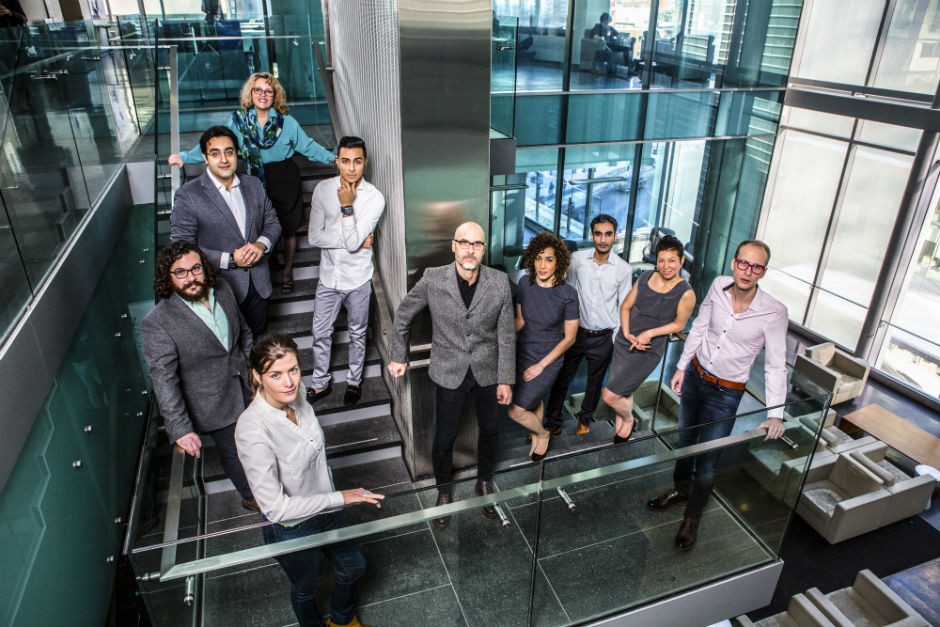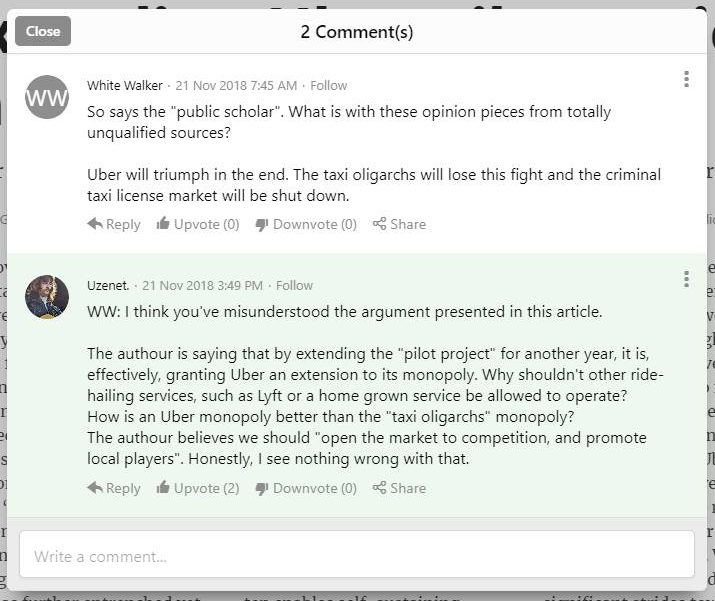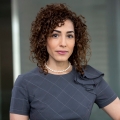Nura Jabagi is a doctoral candidate in Business Technology Management. She holds a Bachelor’s degree in Economics from Queen’s University and an MBA from the John Molson School of Business. Nura’s research is focused on the Digital Economy and understanding how technological advances coupled with macroeconomic trends are disrupting industries, businesses, and jobs. From the gig-economy to AI in the workplace, Nura aims to help organizations better prepare and manage the future of work.
Blog post
Farewell and a few words of advice

With our terms as Concordia public scholars coming to an end, and a year’s worth of experiences to reflect upon, it feels fitting to be writing the last blog of this year’s cohort as a retrospective.
With that in mind, I spoke with a few of my fellow scholars to get their perspective on their unique experience and for any parting words of advice for next year’s cohort, as well as any other young scholars out there looking to increase their engagement with the public.
But first, for those of you reading this blog who may not be familiar with the public scholars initiative, the program began in 2017 with the goal of providing a platform for Concordia’s doctoral students to engage with the greater public.
Launched in collaboration with the Montreal Gazette, each year the program brings together a carefully selected cohort of students from various disciplines who, after 20 hours of training, set out to share their emerging research through a variety of platforms, including blogs, op-eds and knowledge exchange events. If you’re interested in learning more about the program, or applying, you can read more about it here.
Now that we have gotten that out of the way, here are some reflections and pieces of advice from me and my fellow public scholars — Amir Hooshiar, Laura Shine, Michelle Savard, Nikola Stepic and Younes Medkour — to whom I am grateful for contributing to this final blog.
Striking a balance: walking the tightrope between rigor and relevance
In reflecting on her experience, Laura Shine, a PhD candidate in Humanities, has this to say:
“I would suggest that [next year’s cohort] seize on this great opportunity to reflect on how and why research matters in the public eye — one of the things I found particularly interesting during our tenure was the questions that arose regarding how we convey the importance of our research, and the answer is not the same across disciplines and areas of research. For some, it’s very obvious, such as medical or workplace applications; for others, it’s not always as easy to convey utility.
“Which brings me to another issue. [Conveying the value and utility of one’s research] doesn’t mean that we need to twist research into a too-easily digestible format just to render it accessible or make it seem ‘useful’; it’s worth finding the balance between simplification for clarity’s sake and still doing justice to the complex — and tedious — nature of our work. It’s a delicate and personal balance that each scholar has to find.”
Nikola Stepić, doctoral candidate in the fields of Film Studies, English and Art History, has an interesting take on finding the right way to communicate one’s research. Nikola advises scholars to:
“Think about the everyday things you are passionate about, your hobbies or popular culture, and how your engagement with those communities intersects with your research. This kind of shared knowledge might help you communicate your complex research questions and impact to those outside of your field.”
Let your voice be heard
As one of our most productive op-ed writers, Younes Medkour urges next year’s cohort, as well as other young scholars, to “get started straight away with reading the news and writing op-eds. Timing is often key when writing an op-ed and it’s easy to miss a news cycle that is relevant to your work if you’re not paying attention.
“When the 10-year challenge recently went viral on social media, as a doctoral candidate studying aging I immediately saw an opportunity to connect the social media craze to my work. Whether you’re a public scholar or not, op-eds provide a valuable and important opportunity for academics to inform and stimulate public debate through their expertise […] they can even sometimes help shape policy.
“So, I would encourage all young scholars to see what and how their research expertise can help to enrich and broaden the knowledge horizons of the greater community.”
For anyone interested in learning how to write op-eds, Younes and I will be hosting a workshop on the topic at an upcoming event called Survival Skills for Scientists & Engineers. If you can’t make the event, not to worry, our workshop “From scholarly research to crafting an op-ed” will be offered through Concordia’s GradProSkills in the fall and winter semesters. Stay tuned!
Expert, who me? Yes, you!
For me, one of the greatest adjustments in joining the Public Scholars program was recognizing myself as an expert. Ironically, delving deeply into an area of study often brings an acute awareness of how ‘little we know’ and how much ‘out there’ requires more understanding!
It’s hard to get over that feeling sometimes, especially for someone like myself who battles with imposter syndrome — something commonly experienced by graduate students, those working alone, women and ethnic minorities.
Being thrust into the limelight of the Public Scholars program was at times intimidating! With each op-ed I published, I waited for that heckling online commentator, something we were forewarned about during our training, that would come to question my expertise or opinions. And yes, for those who are wondering, someone did comment disapprovingly on one of my many pieces. In fact, a few other Scholars experienced this as well.
As you can see from the screenshot below, there’s no need to reply to negative messages, someone will probably take the time to do it for you and, in doing so, will help to generate thoughtful discussion — thanks Uzenet! So, my advice for scholars writing op-eds in the mainstream media is to ignore the ‘haters,’ stay confident in your expertise and enjoy the limelight, you’ve earned it.

On the topic of expertise, once you find yourself recognized as an expert, a lot of invitations and requests tend to find their way to you. My second piece of advice for next year’s cohort, as well as other scholars that are engaging with the community, is recognizing the importance of knowing when to say yes, and how to say no.
Be diligent in accepting to speak at events or share your knowledge where your expertise lies. When your expertise is tangential, or even unrelated, the easiest and most appreciated way of saying no is by suggesting someone in your network that is qualified — bonus points when you refer someone whose voice would otherwise not be heard, such as a member of a minority group.
Being selective with respect to the events and initiatives that you involve yourself in is key to achieving balance in your life.
The responsibilities of an expert
In reviewing their tenures as public scholars, both Amir Hooshiar, PhD candidate in Mechanical Engineering, and Michelle Savard, PhD in Education, recognized the responsibility that came with being recognized as an expert and having a platform to communicate with a broad audience.
With several speaking engagements under his belt, Amir said that “the most important role of a public scholar in my view is their power of distinction as an expert. People trust their experts, especially those who are selected — as opposed to appointed. This trust is highly worthy.”
Of course, with trust comes responsibility, and so Amir reminds scholars that although we “inform audiences as experts,” scholars have a responsibility to be able to engage and “discuss with neutrality.” Amir also told me that using his voice to help audiences “distinguish between the myths and truths in [his] related field was the most satisfying part” of his experience.
Similarly, recent graduate Michelle highlighted the value of using one’s voice to shine light on important topics. “As public scholars, the activities, talks and audiences we engage with are in the limelight of the university. So, my advice is to make it count. Think about it carefully. How can you use your tenure as public scholar to raise awareness about important issues?”
A few last words
The importance of engaged scholarship is undeniable. When there are open lines of communication between academics and the greater public, everyone benefits. Not only does our knowledge as a society grow but, by connecting with the greater public, researchers learn about what matters most to society; this knowledge allows us to gain better insight into the practical problems that society faces and where to direct our attention.
Ultimately, building bridges between academia and society is the key to crafting more relevant and impactful research. So, whether you’re a public scholar or a doctoral student, finding ways to bring your research to audiences outside of academe — and to hear from them — is a no-brainer.
As other universities look to Concordia’s Public Scholars program to inspire similar initiatives, I feel grateful to have had the opportunity to participate in this unique program and I look forward to continuing to see this program grow and thrive.
A special thank you to all those who make the program possible including Paula Wood-Adams, dean of Graduate Studies, Tatiana St-Louis, Joanne Beaudoin, Allison Saunders and Daniel Bartlett.
Wishing the 2019-20 public scholars all the success and wonderful opportunities that this year’s outgoing cohort has experienced. Make Concordia proud!
About the author


